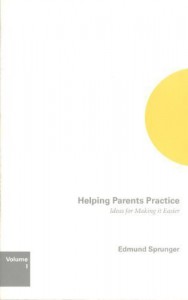Review


This is not a cover to cover read. Instead it's a resource for parents struggling to practice a musical instrument with their child. It's divided into small, clear sections and, therefore, makes a very handy reference.
Sprunger's approach is based specifically on the Suzuki method (the author studied under Shin'ichi Suzuki). The Suzuki method is an extremely nurturing method of musical instruction. It builds on the principle that children are, by and large, products of their environments. And it rejects the notion that some people just can't learn certain things. This is all well and good and fits very nicely into my personal parenting philosophy. But learning a musical instrument can be a frustrating experience - it seems like this is often the case for anything worth doing. And so these philosophies are tried and tested every single day as a parent sits down to practice with their child. It's a battle of wills and personalities - a balancing act of offering love and nurturing along side criticism and instruction. In short, it ain't easy!
For the most part I don't enjoy parenting books. Parent is largely an instinctive role and most books strike me as overly simplistic and a little patronizing. And this book isn't an exeption in that regard, but we could all use some guidance and reassurance and so that's why these books exist. Plus practicing a musical instrument is a rather unique situation. Most of what Sprunger has to say isn't particularly revolutionary, but he does nail some essential truths about the parent/child relationship. Most of us - no matter how much we like to argue against it - are living through our children to some degree. It's basically the level at which we suppress this instinct that defines the parent/child relationship. And that's basically what this book has to say - it acknowledges the struggle and provides some strategies.
Among the main principles he lays out the ones which stuck out to me are:
A lot of the rest is common sense - that the baggage and mood we bring to practice can affect the entire outcome, but this is true of just about everything in life. But I think the thing that struck me the most is a section titled Imagine Practicing with YOUR parent. He asks us to consider what our gut-level emotional response would be if the roles were reversed. Intense....
In the end - this is not a fun read, but I do think it's an essential read for anyone tackling the enormous feat of daily music practice with a child.
Sprunger's approach is based specifically on the Suzuki method (the author studied under Shin'ichi Suzuki). The Suzuki method is an extremely nurturing method of musical instruction. It builds on the principle that children are, by and large, products of their environments. And it rejects the notion that some people just can't learn certain things. This is all well and good and fits very nicely into my personal parenting philosophy. But learning a musical instrument can be a frustrating experience - it seems like this is often the case for anything worth doing. And so these philosophies are tried and tested every single day as a parent sits down to practice with their child. It's a battle of wills and personalities - a balancing act of offering love and nurturing along side criticism and instruction. In short, it ain't easy!
For the most part I don't enjoy parenting books. Parent is largely an instinctive role and most books strike me as overly simplistic and a little patronizing. And this book isn't an exeption in that regard, but we could all use some guidance and reassurance and so that's why these books exist. Plus practicing a musical instrument is a rather unique situation. Most of what Sprunger has to say isn't particularly revolutionary, but he does nail some essential truths about the parent/child relationship. Most of us - no matter how much we like to argue against it - are living through our children to some degree. It's basically the level at which we suppress this instinct that defines the parent/child relationship. And that's basically what this book has to say - it acknowledges the struggle and provides some strategies.
Among the main principles he lays out the ones which stuck out to me are:
1.) The child doesn't have to love practice and doesn't even have to be enthusiastic about it, but he does have to do it. As silly as it may seem, this in an of itself was a big revelation for me. It's okay to acknowledge that practicing is a chore sometimes!
2.) The focus of practice shouldn't be about fixing problems, it's about making things easier. Again, a big revelation for me. Sure there are things you'll need to address and tweak in practice, but largely the effort of practicing is to make the overall work easier.
A lot of the rest is common sense - that the baggage and mood we bring to practice can affect the entire outcome, but this is true of just about everything in life. But I think the thing that struck me the most is a section titled Imagine Practicing with YOUR parent. He asks us to consider what our gut-level emotional response would be if the roles were reversed. Intense....
In the end - this is not a fun read, but I do think it's an essential read for anyone tackling the enormous feat of daily music practice with a child.






